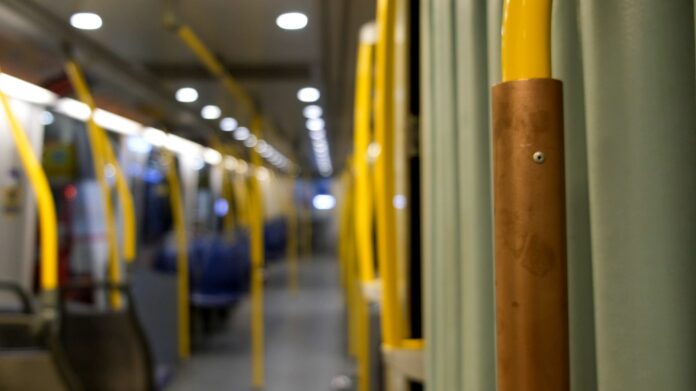TRANSLINK will be the first transit system in North America to pilot the use of bacteria-and-virus-killing copper on high-touch transit surfaces. This industry-leading project is part of a study that will see various copper-based products and a protective coating called organosilane installed on SkyTrain and buses to test how effective these agents are at destroying viruses and bacteria on transit.
There will be comprehensive testing as part of the initial four-week pilot phase:
* Products will be installed on two trolley buses on high-ridership routes and two SkyTrain cars on the Expo and Millennium Lines.
* Twice weekly the surfaces will be swabbed and tested to determine antimicrobial effectiveness of the products.
* At the end of one month, the surfaces will also be assessed for durability.
The results of this pilot could have wide-reaching impacts for infection prevention for the transit industry and other industries that rely on shared public spaces.
Copper alloy surfaces are naturally antimicrobial with self-sanitizing properties. Recent literature shows that copper alloy surfaces destroy up to 99.9% of bacteria and viruses within four hours. Organosilane is a wipe-on coating that can provide long-lasting protection against damaging microbes such as bacteria, mold, mildew and many viruses. When used in tandem with good hygiene and cleaning protocols, copper and organosilanes can help inhibit the buildup and growth of viruses and bacteria.

The project is the result of a partnership between TransLink, Teck Resources Limited (Teck), Vancouver Coastal Health, VGH & UBC Hospital Foundation, Coalition for Healthcare Acquired Infection Reduction (CHAIR) Canada, and the University of British Columbia. This initial phase is fully funded by Teck, as part of its Copper & Health program. It is based on preceding studies conducted by the Infection Prevention & Control team at Vancouver Coastal Health and supported by Teck that have shown copper is effective at killing bacteria and is durable over a period of many years.
TransLink is aiming to make transit one of the safest public spaces throughout the pandemic and this measure builds upon the Safe Operating Action Plan. TransLink will continue to research, develop, and implement industry-leading practices on all modes of transit in Metro Vancouver.
Kevin Desmond, TransLink CEO, said on Tuesday: “We’re proud to be the first transit agency in North America to pilot this industry-leading technology and I look forward to working closely with our project partners. We’ve been carefully examining new ways to ensure transit is one of the safest public spaces throughout the pandemic. The risk of COVID-19 transmission on transit remains extremely low and this initiative will only bolster our comprehensive cleaning protocols which are already in place. Any findings from this pilot project will be shared with our fellow transit agency colleagues and other industries which may be able to use this emerging technology.”
Don Lindsay, President and CEO, Teck, added: “We are proud to be working with all the partners on this important pilot project to expand the use of antimicrobial copper in high-traffic public areas and prevent infections. Through the Copper & Health program, Teck has been partnering with healthcare professionals, academia and others for years to help make communities safer. This pilot builds on those efforts at a critical time as the world works to prevent the spread of COVID-19.”
Dr. Marthe Charles, Medical Microbiologist, Vancouver Coastal Health, said: “This project builds on preceding research and will increase our understanding of the effectiveness of copper in killing organisms on frequently-touched surfaces. Positive findings will then be used to study the impact of copper on bacteria and viruses such as COVID-19 and norovirus. This holds future infection control benefits not only for the public in their travels but for healthcare workers and patients who navigate their medical journey at Vancouver Coastal Health and beyond.”
Angela Chapman, President and CEO, VGH & UBC Hospital Foundation, pointed out: “Our foundation plays a vital role in funding innovation through medical research in BC. Donor funding has played a role – here in BC and globally – to accelerate our understanding of the COVID-19 virus and its transmission. This project will leverage the expertise of Vancouver Coastal Health’s Infection Prevention & Control team to determine the public health benefits of copper in reducing transmission of COVID-19 and other viruses. We are grateful for the partnership of Teck and TransLink to make this very special “made in BC” research project possible.”
Richard Dixon, CHAIR Canada, Chairman and Chief Technology Leader, said: “CHAIR Canada has the privilege of being able to be the project manager for this exciting and innovative transit project that has great potential to make a lasting difference in many facets of daily life for the public. We are a non-profit organization that emphasizes technologies and strategies such as copper alloys that make a major difference in air, water and surface contamination. We work with leading Canadian and international healthcare and industry organizations within the context of these key themes: Collaborate, Investigate, Innovate, Educate, Advocate and Research.”










